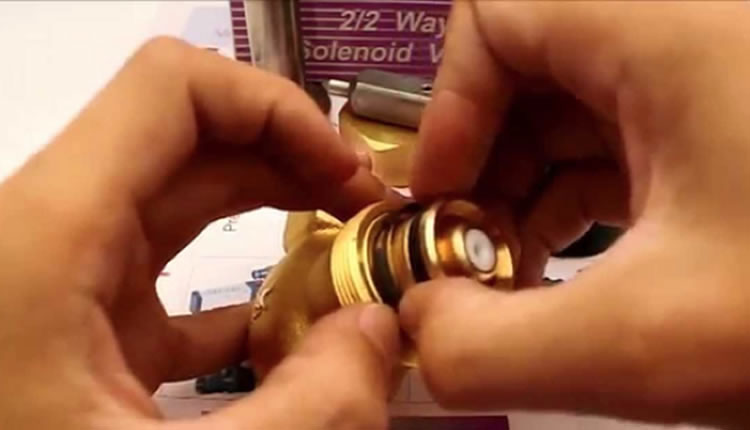To keep your instrument in the best possible condition, please consider the following information.
Valve Oil
Valve oil has three purposes: it cleans, lubricates, and it fills air space. An un-oiled piston will wear faster than a regularly oiled piston. Al Cass is a good brand to use until you have experimented and found another brand that works well. Avoiding cheap, low quality or off-brand oils will be beneficial to your instrument. Do not use a kerosene-based oil; the fumes are harmful to you.
How to oil your valves
Oil your valves preferably every time you play, or at least three times a week. It is suggested that the valves are not removed from the casing when they are oiled. This advice is given because no matter how careful you are; the probability of an accident occurring and damaging your piston is greatly increased when the piston is outside the casing.
The suggested method for oiling your valves is to unscrew the top cap and pull the piston out far enough to see the actual valve. Then add enough oil to fully cover the surface. A common mistake is to not use enough oil on the valves. Over oiling your valves will do no harm to your instrument, it will only waste oil.
It is also suggested that you do not turn the valve around in the casing. This has the potential of wearing the valve faster. The oil will naturally distribute itself fully by the time the valve has been depressed once.
Please do not oil your valves from the bottom caps. This takes all the gunk that has collected in the bottom caps and puts it directly into the valve. As well as not allowing the oil to get to the surface it needs to lubricate.
Amado Water Keys
An Amado water key is a miniature piston so it will need to be oiled regularly. They should have a drop of oil through the water hole at least once a month.
Slide Grease
It is a good idea to have at least two usable or disposable cloths when greasing slides.
- First remove the slide and wipe off the old grease with one cloth.
- Apply a bit of slide grease to one end of one slide tube.
- Insert only this side, and twist the slide as it is pushed in. This will evenly distribute the grease to all parts of the slide.
- Repeat with the other slide tube.
- Once both slides are greased, insert the slide as normal and use the clean cloth to wipe excess grease away.
A slide grease that works well is Conn or Benge (same product, different label). Vaseline should not be used for slide grease; it is a corrosive to the brass. An indicator of Vaseline use is darkened or black inner slide tubes.
When storing an instrument for a long period of time oil the valves heavily and grease the slides and bottom cap threads well. When installing the slides prior to storage do not push them all the way in. Leaving a small gap makes the slide easier to remove if they do stick. One of the best lubricants to prevent stuck slides is anhydrous lanolin. Every day usage of anhydrous lanolin is not recommended because it is gooey, collects dirt, and is messy to work with. However, it will not harm the instrument and does not break down quickly.
Maintenance
Your mouthpiece should not have any dents in the end of the shank. Dents allow the mouthpiece to become easily stuck and the dented shank can disturb the airflow of the instrument. Dents in mouthpiece shanks are easily removed and should be repaired by a qualified repairperson as soon as possible.
Moving and greasing all slides and bottom caps at least once a month will help prevent stuck slides and caps. When the bottom cap is removed add slide grease to the inner threads on the cap. If the bottom caps are very dirty you may want to wash them in warm water and mild detergent and let dry completely before you grease and reassemble. Brass sticks when bare brass (no grease/oil) is in contact for extended periods of time. Also very dirty grease that is left sitting can also cause stuck slides. If a stuck slide or cap is discovered have it repaired by a technician soon. Do not attempt to remove the caps or slides; this can severely damage the cap, casing and piston or the slide.
Please do not use lotion silver polishes on your instrument. The lotion can make a mess and harm your instrument. If you use a treated polishing cloth for any finish make sure it is for the proper finish. An example of why not to use the wrong cloth is that raw brass cloths can scratch and harm lacquer. One of the best ways to keep your instrument’s finish looking nice is to wipe off your fingerprints after every use. A clean non-treated cotton cloth works well for this.
It is recommended that an instrument is taken to a professional repair technician at least once a year for general maintenance and cleaning. Doing so may prevent costly repairs that arise from lack of professional repair attention. A qualified technician can often discover a problem that you have learned how to overlook, play through or are not aware of. Regular maintenance and professional chemical cleaning will also help prevent and retard red-rot from eating through a brass instrument.
Case
Do not set anything on top of an instrument in its case. This means sheet music! Damage occurs easily when items are set on the instrument and the case closed.
Make sure the case is secure. Check all the hinges, latches, and handles to see if they are solidly fastened to the case and they close the case securely. Make sure that the instrument does not move around inside the case.
Please do not sit, rest feet on or otherwise apply pressure to the outside of an instrument case. This can damage your case so that it does not properly protect the instrument.
Carry the case so that if it does open, it will open toward your body, not the ground.
Emergencies
In an emergency, please avoid any adhesives. Use dental floss, Teflon (plumber’s) tape, or something that will be easily removed when the instrument is properly repaired. Super-glue will make a mess if a solder joint breaks. Tape adhesive can create more of a mess than the temporary repair is worth.
A word of caution, rubber bands can eat silver plate, so it is best to avoid any use of rubber bands on silver instruments.
Broken solder joints should not be ignored, have a qualified technician repair it properly as soon as possible.
Never use pliers or hammers on your instrument. Improper use of household tools is a common cause of unnecessary damage to an instrument.
This information is provided for the benefit of your instrument by:
Windys Winds
Brass and Woodwind Repair
Windy and Benjamin Shaffer
559 West 200 North
Cedar City, Ut 84720-2406
867-8998
Toll-free (888) 773-0104
E-mail windyswinds@napbirt.org



